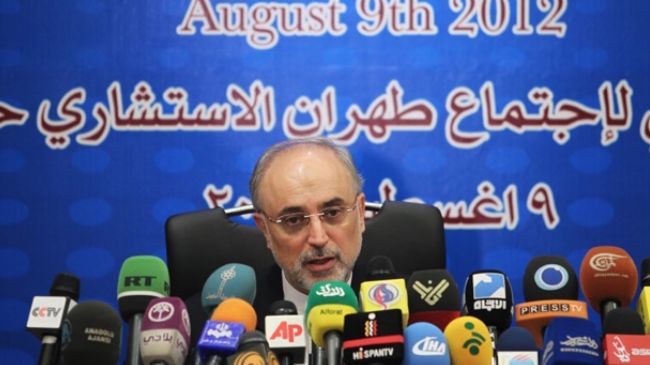
Foreign Minister Ali Akbar Salehi talks to the press after Thursday's conference on Syria
In the end, the regime persuaded 28 countries to attend Thursday's hastily-called conference on Syria. Almost all sent their Ambassadors or other diplomats from their Embassies in Tehran, with only three --- neighbouring Iraq and Pakistan and not-so-neighbouring Zimbabwe --- sending Foreign Ministers. Eight Arab States were present; those who stayed away included Saudi Arabia and Lebanon. Russia, albeit with grumbling about the rushed preparations, despatched an official, but Turkey, which pointedly slapped down Tehran on Tuesday, did not.
Iranian media posted a statement which was supposedly agreed by the representatives, with a call for talks and despatch of humanitarian aid, affirmation of the six-point Annan Plan, and a proposed three-month cease-fire beginning next week.
None of that is likely to have any effect on the Syrian crisis, but Tehran's strategy is geared more to presentation. Shut out of other international discussions and facing isolation in the Middle East, the Islamic Republic wants to present itself as the valiant bearer of the Annan Plan, now that the United Nations process is dormant.
I doubt that, on the overseas front, Iran will get more than 15 minutes of attention with the initiative --- yesterday's flurry of coverage has already dissipated. There has been little reaction or follow-up by other countries, let alone in Syria, where the abduction of 48 Iranians poses an immediate problem for the regime.
At home, Iran's leadership can project that is doing something to claim high political and moral ground, even as it grows more concerned about the fate of President Assad. This morning the regime is proclaiming that it will take its initiative to next week's extraordinary summit of the Organization of Islamic Cooperation in Saudi Arabia. Foreign Minister Ali Akbar Salehi declared:
By attending the summit, we will express our viewpoints and try to bridge the gaps and narrow the differences through dialogue. The Islamic Republic of Iran seeks to heal the rifts and reduce the differences, and focus more on joint issues through such talks.
That approach is an attempt to cover up the reality that the Saudis, with their manoeuvring versus Iran for influence in the Syrian crisis and in the Middle East, extended an invitation to the Iranians at the last minute --- and the further reality that, close to cap in hand, President Ahmadinejad accepted. Whether it works, in the international arena or for domestic presentation, will become clear by the end of that summit next week.